The Light from the TV Shows: A Chat with Pam Grier (TV One’s ‘Unsung Hollywood’)
Fans of TV One’s documentary program Unsung, which shines the spotlight on performers whose mainstream profiles aren’t as substantial as they perhaps out to be, will be pleased to learn that the network is branching out with the series, expanding its coverage beyond the world of music and into the field of acting. Tonight marks the premiere episode of Unsung Hollywood, which kicks off with a look at the life and career of Pam Grier, and Bullz-Eye was fortunate enough to be able to sit down with Grier and discuss the episode and how it came about while also chatting a bit about her career…but without giving away too much about the program, of course.
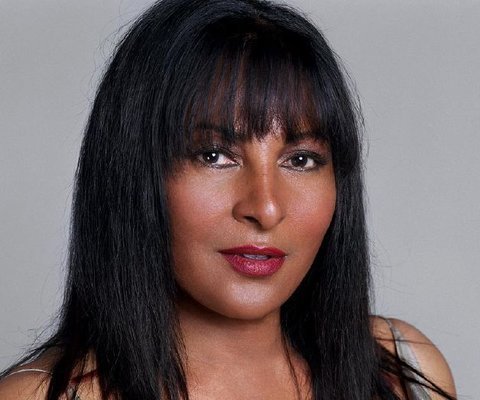
Bullz-Eye: How did you find your way to Unsung Hollywood? Did they pitch you on the idea?
Pam Grier: I had turned them down several times, because I wasn’t interested, but then I saw one of their episodes. My mom was so enthralled by one of the shows they had done on musicians – they did an excellent job – and she said, “I didn’t know that!” And, of course, no one knows what inspired the music and the tenacity of people to get their music played and all that except for the musicians. So we talked, and they said what they were going to do, and I said, “Okay, but you know it’s very difficult to get photographs.” Because as I learned from doing my book (Foxy: My Life in Three Acts), you have to have the rights if someone owns the photographs, and if someone else is in it, you have to get the rights from those people.
I said, “I don’t know if I can do that, because you’re going to get maybe five pictures, because a lot of people do not want to participate.” So I said, “I don’t want to marginalize it, but I can only give you so much, and I don’t know when I can do it.” But they kind of gave me an outline, and I said, “Oh, I think we can do this…so I just have to find the time!” And I did. And I think they did an excellent job.
BE: Given that you’d been hesitant about doing it in the first place, were you concerned…
PG: …that I’d be boring? [Laughs.] I really didn’t want to talk about me. I was, like, “Am I going to be narcissistic? And boring?” When you’re 10 years into it, you’re, like, “Oh, I’m going to talk about myself and see if I can get one more award.” When you’ve had a 45-year career, you’re just not even interested in doing it anymore.
BE: Did it prove to be relatively painless in the end?
PG: Well, sometimes. [Laughs.]
BE: Some bits were less painless than others, apparently.
PG: Well, I can’t judge what other people do or what inspires them or how they’ve lived their lives or if they’re interesting or not. A lot of people are actors, but you don’t know what they’ve turned down. I try to tell people that there are roles that, because of religious dogma, certain people don’t do them. There are women who wanted to be in The L Word but wouldn’t kiss another woman, and there were actresses who just wouldn’t play a gay woman for whatever reason. But I can’t speak for other people.
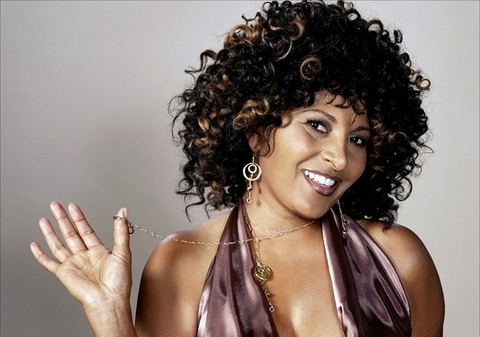
BE: Actually, what I meant was if this documentary proved relatively easy for you to do.
PG: No. [Laughs.] To have to spend time talking about yourself… Ugh! It’s like pulling teeth. I thought I was going to get a hernia from it! But I tried to be interesting, and I was, like, “What can I reveal that hasn’t been overly done already?” Though, of course, most of it really hasn’t been. That’s why I haven’t done shows like this before. You have to live a few years first – decades, really – to hopefully find something to talk about that you can share and inspire others. If you’re just talking about yourself and there’s no inspiration, then why bother? We’re here to teach. And leave legacies that are important.
BE: As far as revealing something that you hadn’t revealed before, I presume that was at least a little bit difficult, given that – as you said – you’d already written your autobiography by then.
PG: Ah, but not everybody read my book! [Laughs.] Some people don’t want to read. They want to hear audio books. Or have me say, “Okay, you sit here and I’ll read my life to you!” But they learned a lot about my character, about the people in my family, and about the black west, how strong and prolific the women were. City women were more pampered than country or rural women. Rural women chopped wood and gave birth and did things that city women don’t do. But my grandfather was the first feminist that wanted me to do whatever the boys did. All the girls needed to do what the boys did – hunting, fishing, driving – and be independent, not codependent, and not to be justified by marriage. He wanted us to have an identity.
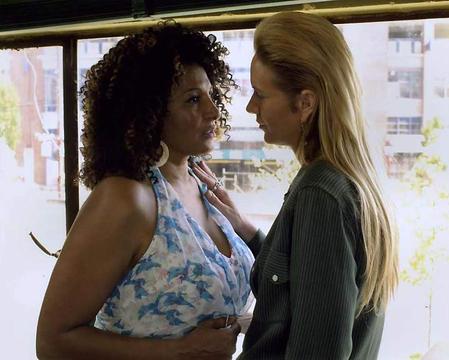
BE: You mentioned The L Word. I’ve done a couple of interviews with Kelly Lynch…
PG: Yes!
BE: …and, of course, she said that working on that series with you was one of the highlights of her career.
PG: Oh, I loved working with her! Are you kidding me? We had a ball! But it was difficult. Not only the work, but creating and making sure her character had the clarity she needed, so I had to be there for her character, and…it was really a major amount of work for me. It really was. But it wasn’t uncomfortable. You’re just kissing a human being. I’m not romantically interested in women. I don’t want to procreate with them. [Laughs.] I’m very much into men! That, I know of myself. But the fact that I was playing this very complex character was just… Well, it was really interesting, because I think the actresses in that show are magnificent. And should’ve been nominated for awards and recognized for their work. But if it’s aired again, perhaps there’d be a different recognition. Because it started in 2004 and went through 2009. But the performances were stellar and the writing was just amazing.
BE: She said that the only show that could rival The L Word for fashion was Magic City.
PG: [Laughs.] I know she did say that! I love her!
BE: How did you find your way onto The L Word in the first place?
PG: It was Jennifer Beals and Jerry Offsay, who was the president of Showtime. They wanted someone to play Jennifer’s older sister who sang and played instruments, and so I had all of that, and they said, “Perfect!” [Laughs.] “Let’s get Pam!” And he called me – I was in the kitchen – and he said, “Are you going to have dinner with me in Vancouver?” And I panicked. I went, “How did I forget that? Am I having dinner with Jerry Offsay in Vancouver? Did someone forget to tell me that I was supposed to be on a plane to there?” And I said, “Uh, am I?” And he said, “Yeah! You’re gonna play in this series. You’re gonna play Jennifer Beals’ sister…aren’t you?” I said, “I don’t know! How’s the script?” He said, “I’ll send you the script.” And that’s how it started.
Once I read it, I said, “I have to do this.” Because I wasn’t aware of the discriminatory practices against the gay community outside of hearsay, so I really wanted to know, so I could be a beacon and a comfort zone and help with the comprehension for people who don’t understand that community and think it’s a foreign, goony-goo-goo group of people from another planet. And it’s not. It’s a part of our humanity that people have filtered out for generations.
BE: During the TCA panel for Unsung Hollywood, you touched momentarily on a new series you’re working on. Can you talk a bit more about that?
PG: A little bit. It’s a woman who’s brought out of retirement to helm a Homeland Security group in the heartland. It’s called Strikeback Homeland.
BE: Will it be a procedural sort of thing?
PG: Um…yes. There’ll be cases – real cases, a lot of real stories – so we can really get to the psychoses, the psychology, the political theory of people, and their anxieties and phobias. If anything, we’re going to cross some boundaries. It’s edgy. It’s real.
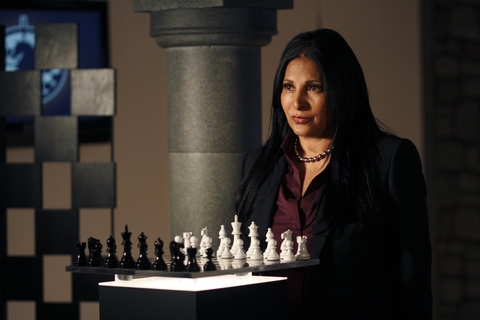
BE: As a comic book geek, I have to ask you about working on Smallville.
PG: I loved that. Are you kidding? I loved playing Amanda Waller! [Laughs.] 200 pounds and pearls, and she kicks butt! I was a big fan of that character in the comic books forever, and when they called me… I was at a Comic-Con, saw the character in a comic book, and I said, “Wow, look at her! She’s great! She’s interesting…” And the next thing you know, they called me. Be careful what you think, right?
But I loved playing that character, meeting Tom Welling and everyone who did the show. I just saw this character from the comic book come alive, how she would walk and how she would stand… I said, “I have to create her!” And then they wrote it into the script that Checkmate was in Castle Rock, Colorado, and there’s this huge stone, this massive boulder that’s the size of several blocks, that sits on the top of this mesa. There’s a flag on it. So they used that as the fortress of Checkmate, and Castle Rock loves me. I get free parking! [Laughs.]
BE: Was there ever any talk about spinning Amanda Waller off onto her own series?
PG: No, they never have. I don’t know if it’s because they’re following her story, the truth to her history, and the narrative of Amanda Waller coming from Chicago and having her family slaughtered, and why she chose to go out and see revenge and just be this guardian of the superheroes. You almost think that she might be a fence-sitter. She might be paid to not watch them. But that’s not in her heart. She’s very loyal, she’s a patriot, and she’s going to protect the superheroes. She’s definitely going to do that.
BE: Do you have a favorite project that you’ve worked on over the years that didn’t get the love you thought it deserved? It sounds like you’d say that The L Word would quality.
PG: No, because you’ll never know what’s going to generate interest or not. I certainly won’t know. Especially if it’s not my show, if I’m just an actor on it. The producers and the network might know, but I won’t.
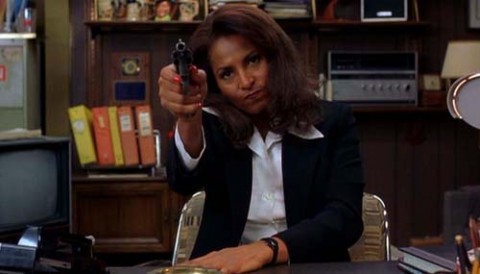
BE: To close on a completely goofy question, what do you remember about working on The Love Boat?
PG: Um…the fact that everyone was seasick. [Laughs.] But I loved working with Richard Roundtree and meeting the cast. But I wanted to do comedy and be silly and not always be so serious and dogmatic about everything. I just wanted to do comedy. And it was refreshing to do it. And then I wanted to do more. I said, “I really like comedy!”
BE: So I presume you enjoyed doing Mars Attacks, then?
PG: Oh, of course. Of course! But I wasn’t going to do that one, either. I was familiar with the comic book, and Tim Burton had called me to audition, but one of my dogs was dying of cancer, so I wasn’t in the frame of mind to audition to do that role. So I said, “I can’t,” and I turned down Tim Burton. And I remember one of my dearest friends who I knew before he became an actor –Michael Keaton, who was in Beetlejuice and should’ve won an Oscar for that role, he was so brilliant – I told him that I’d turned Tim down. I said, “I’m just not ready to read, because one of my dogs, one of my family members, is very ill. I just can’t do it. So I passed.”
But they called back again, and they said, “Well, would you put something on camera?” And I said, “No, because what I’ll put on camera is sadness, and I’m not ready to do that right now.” I’m one of those people who can afford to say “no.” Even to Tim Burton, as badly as I wanted to work with him because of Beetlejuice. And he related. He respected that.
And then they called back again…and they said, “Well, you’ve just auditioned. Because in the story, she’s a mom who protects her children. Even under the worst situations, she won’t leave her children. She’s a true mom.” And I wouldn’t leave my dog, not for anybody – including Tim Burton – or for a huge salary or to work with Jack Nicholson or Glenn Close or the rest of the stellar cast of that film. So he said, “You passed the audition. You wouldn’t leave your family for me, so you’ve got it. And we’ll shoot around you. We’ll wait, and you let us know when the time is right, when you’re ready to shoot.” And I said, “Thank you, but it could be awhile. I don’t know. But I’m not leaving his side, because I had cancer, and he was with me.”
But they waited. They shot around me until I was ready to say, “Okay, he’s passed on. He let me go.” And Tim and I have been great friends ever since…because I said “no.” Sometimes you just have to say “no.” But once I was in it, it was such a joy working in those scenes, and with Ray Jay and Brandon. And it was great to work with Jim Brown. We had scenes, too. It’s amazing when you work on films of such stellar directors, you know the budgets are gonna be incredible and the sets are gonna be incredible. There’s no expense spared. It’s just gonna be fabulous. When you work with directors like that, on that level, you go, “Oh, my God, just enjoy it!” [Laughs.] Because you know it’s just going to be a superb experience. And not only did I learn a lot about myself, but I learned that I want to work with Tim Burton in anything. He’s just a very special person.
Related Posts
You can follow us on Twitter and Facebook for content updates. Also, sign up for our email list for weekly updates and check us out on Google+ as well.
Posted in: Entertainment, Interviews, Movies, News, Television
Tags: Jennifer Beals, Jerry Offsay, Jim Brown, Kelly Lynch, Mars Attacks!, Michael Keaton, Pam Grier, Richard Roundtree, Smallville, The L Word, The Light from the TV Shows, The Love Boat, Tim Burton, Tom Welling, TV One, Unsung, Unsung Hollywood, Will Harris










